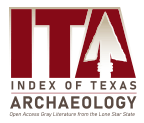Home > Research Projects and Centers > Center for Regional Heritage Research > Index of Texas Archaeology > Vol.
Article Title
Agency
Texas Historical Commission
Abstract
Archaeologists from the Center for Archaeological Studies (CAS) at Texas State University conducted an intensive pedestrian survey including the excavation of 1 mechanical trench and 13 shovel tests along a proposed drainage easement northwest and west-southwest of FM 2770 (also known as Jack C. Hays Trail) in Buda, Texas, from May 14–15, 2018. The survey was executed in order to assess the project area for potential impacts to cultural resources in advance of the installation of a proposed new outfall channel and culvert under FM 2770 in order to divert excess flow from the unnamed tributary of Onion Creek in the City of Buda. Work was carried out by CAS archaeologists Jodi Jacobson and Victoria Pagano under Texas Antiquities Permit Number 8407, assigned to Principal Investigator Jacob Hooge.
The area of potential effects (APE) includes a narrow drainage easement no more than 1,600 linear feet, a construction easement width not to exceed 180 feet, with depths not likely to exceed 14.5 feet for a total project acreage of 6.7 acres The project area extends approximately 400 linear feet northwest of FM 2770 and approximetely1,100 linear feet east-southeast. While planned for city acquisition, the property was privately owned and undeveloped at the time of survey. During survey a total of four positive shovel tests with non-diagnostic lithic flakes were encountered, two of which also contained clear bottle glass. Flakes were limited to the upper 70 centimeters (cm) of one of the positive shovel tests and limited to the upper 50 cm of the remaining three. The bottle glass was identified mixed within and even at levels below the flakes in two of the tests with presence depths of historic context not exceeding 50 cm, with an additional surficial scattering of some 20th century mixed with modern mostly surficial trash debris. Given the disturbance, all prehistoric deposits within the project area would be lacking in integrity. CAS recommends that site 41HY548 within the project boundaries would be ineligible for inclusion in the National Register of Historic Places due to lack of integrity of association, setting, or material based on the mixed nature of the deposits, as well as a lack to provide new or additional information. CAS recommends full regulatory clearance for the proposed project.
Creative Commons License

This work is licensed under a Creative Commons Attribution-NonCommercial 4.0 International License
Included in
American Material Culture Commons, Archaeological Anthropology Commons, Environmental Studies Commons, Other American Studies Commons, Other Arts and Humanities Commons, Other History of Art, Architecture, and Archaeology Commons, United States History Commons
Submission Location
Tell us how this article helped you.


